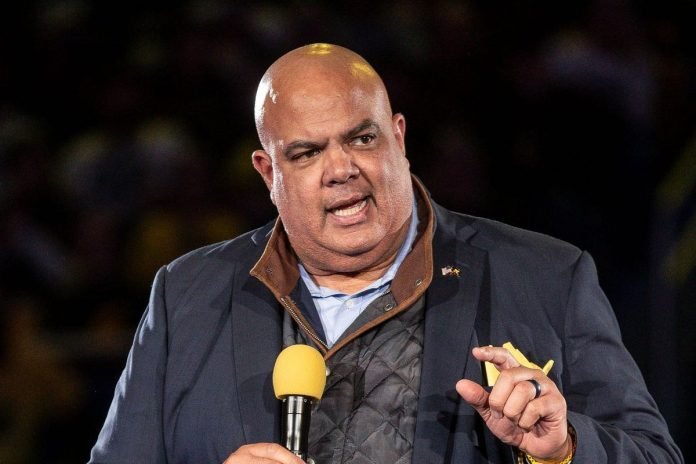Blog
Crisis Arise As Head of College Football Playoff Committee Explains Controversial kentucky football Ranking #FixThePlayoff

The recent College Football Playoff rankings sparked widespread controversy when the committee, led by Warde Manuel, placed Kentucky in a position many deemed inconsistent with its season performance. Manuel defended the rankings by citing the committee’s criteria, which include strength of schedule, game control, and comparative outcomes. However, the decision has left fans and analysts questioning the consistency and transparency of the ranking process.
Kentucky’s placement raised eyebrows, especially when compared to teams with similar records and resumes. Critics argued that the Wildcats’ schedule lacked the quality wins seen in other programs ranked nearby. Furthermore, the team’s losses were perceived as more damaging than the rankings reflected. Manuel responded by emphasizing the committee’s holistic approach, noting that individual game contexts and head-to-head matchups played significant roles in the final evaluation.
The uproar surrounding Kentucky’s ranking has reignited calls for greater clarity in the playoff selection process. Many fans and analysts feel that the subjective elements of the rankings create too much room for perceived bias. The controversy has also amplified debates about expanding the playoff field, with advocates suggesting that a broader playoff structure would alleviate disputes over borderline teams.
Social media amplified the backlash, with many fans expressing frustration over what they viewed as inconsistent criteria. Some supporters of rival teams pointed to their programs’ more challenging schedules and more convincing performances, questioning why Kentucky received preferential treatment. The hashtag #FixThePlayoff trended on various platforms, highlighting the widespread dissatisfaction among the college football community.
Analysts dissected Kentucky’s schedule, noting that while the team had moments of brilliance, it also faced weaker opponents compared to others in the rankings. The Wildcats’ signature wins were put under scrutiny, with some arguing that their victories over mid-tier teams were insufficient to warrant such a high ranking. Conversely, Manuel and the committee defended the Wildcats’ placement by highlighting key metrics, including offensive efficiency and their ability to control games against conference opponents.
The controversy also extended to media coverage, with sports networks dedicating hours of programming to dissect the rankings. Former players and coaches weighed in, with some defending Kentucky’s position and others calling it an oversight. The split opinions reflected broader tensions within college football over the playoff system, which has faced criticism since its inception for lacking transparency and inclusivity.
This ranking incident also brought attention to the limitations of the current four-team playoff format. Many argued that an eight- or twelve-team playoff would reduce the stakes of such contentious rankings, allowing more teams to compete for the national title. Proponents of expansion believe it would provide a fairer opportunity for programs like Kentucky to prove themselves on the field rather than relying solely on committee evaluations.
For Kentucky, the heightened scrutiny could serve as motivation for the remainder of the season. Players and coaches expressed confidence in their ability to prove their worth, using the controversy as a rallying point. Meanwhile, rival teams may see this as an opportunity to challenge the committee’s judgment by delivering statement wins against the Wildcats.
The broader implications of this controversy could impact the future of college football. Calls for reform within the selection process are growing louder, with stakeholders from fans to university administrators demanding greater transparency. Proposed changes include publishing detailed explanations of rankings and incorporating additional metrics to reduce subjectivity.
Manuel acknowledged the challenges of the selection process, stating that the committee strives to balance multiple factors while remaining impartial. He reiterated the importance of context, emphasizing that each team’s path to success is unique and cannot always be captured by simple statistics. However, his remarks did little to quell the outrage among fans who believe the current system fails to deliver consistent results.
As the college football season continues, all eyes will be on Kentucky to see if it can justify its ranking through its on-field performance. The Wildcats face a challenging road ahead, with opportunities to solidify their position or validate critics’ concerns. For the playoff committee, the Kentucky controversy serves as a reminder of the complexities involved in ranking teams and the high stakes of their decisions.
In the end, the controversy underscores the passion and intensity of college football fandom. While the playoff rankings aim to provide a fair and competitive structure, they also reveal the inherent challenges of evaluating teams in such a diverse and dynamic sport. Whether through expanded playoffs, revised criteria, or improved transparency, the future of college football will undoubtedly continue to evolve in response to these debates.
-

 Blog3 months ago
Blog3 months ago“Voglio lasciare la Fiorentina” Yacine Adli sorprende la Fiorentina con una richiesta di trasferimento improvvisa
-

 Blog3 months ago
Blog3 months agoUltime notizie: Alisha Lehmann ha rescisso il suo contratto con la Juventus e dovrebbe lasciare il club la prossima stagione a causa di…
-

 Blog3 months ago
Blog3 months agoUltime notizie: rivelata la nuova data per la partita Inter Milan-Fiorentina
-

 Blog2 months ago
Blog2 months ago“Voglio andare via”. Yacine Adli sorprende i tifosi della Fiorentina, dicendo che vuole lasciare la Fiorentina per
-

 Blog7 months ago
Blog7 months agoTRISTE NOTIZIA: L’allenatore della Juventus Thiago Motta è rimasto coinvolto in un incidente stradale a causa…
-

 Blog1 month ago
Blog1 month agoUltime notizie: finalmente Sandro Tonali ha firmato….ha accettato di tornare al Milan, accordo firmato e sigillato
-

 Blog2 months ago
Blog2 months agoIl più grande affare di trasferimento…Eccoci qui!!!! Affare fatto Victor Osimhen ha accettato l’enorme accordo della Juventus per un valore di…
-

 Blog3 months ago
Blog3 months agoUltime notizie: Francisco Conceição e l’FC Porto hanno rifiutato l’offerta di trasferimento di 70 milioni della Juventus a causa di
